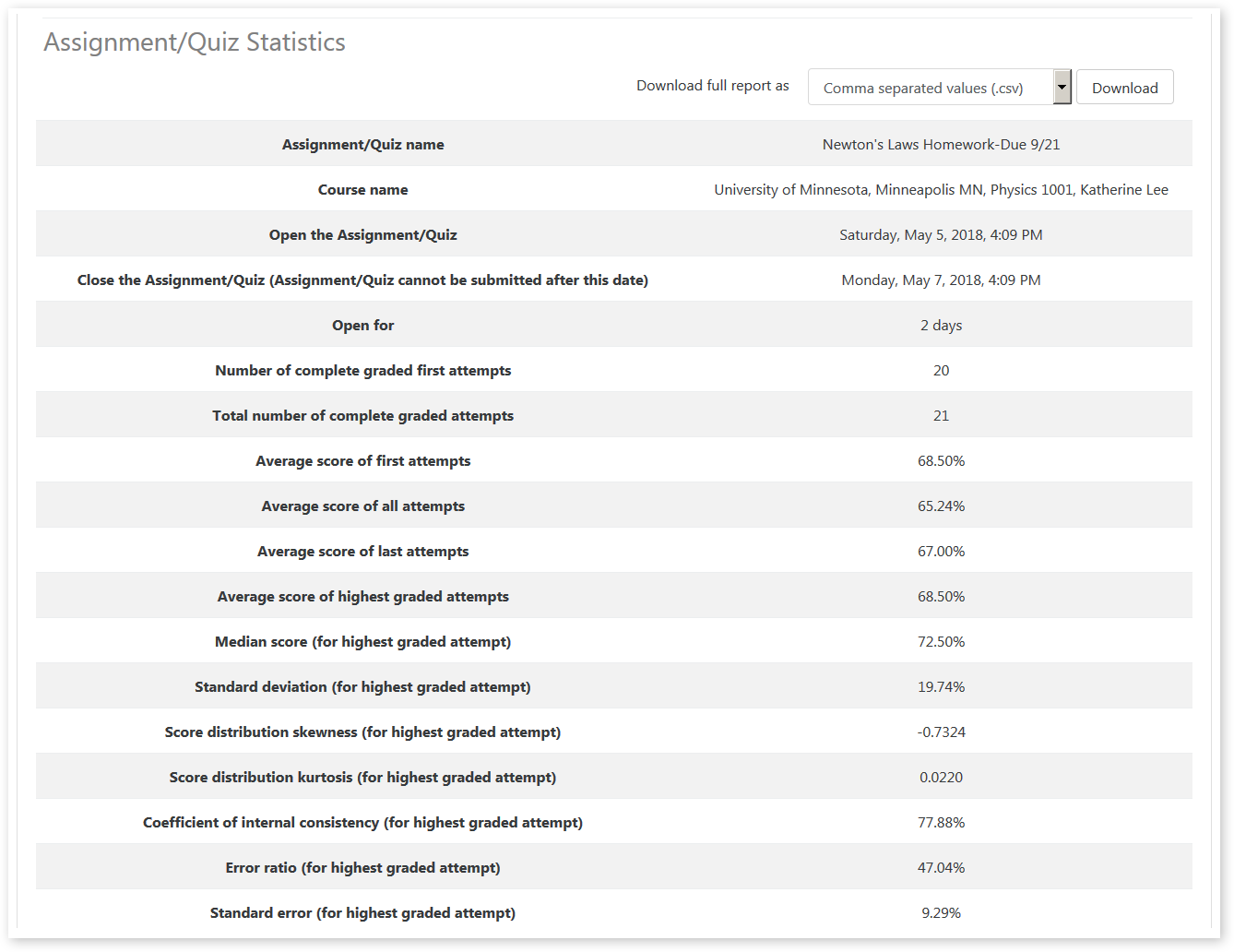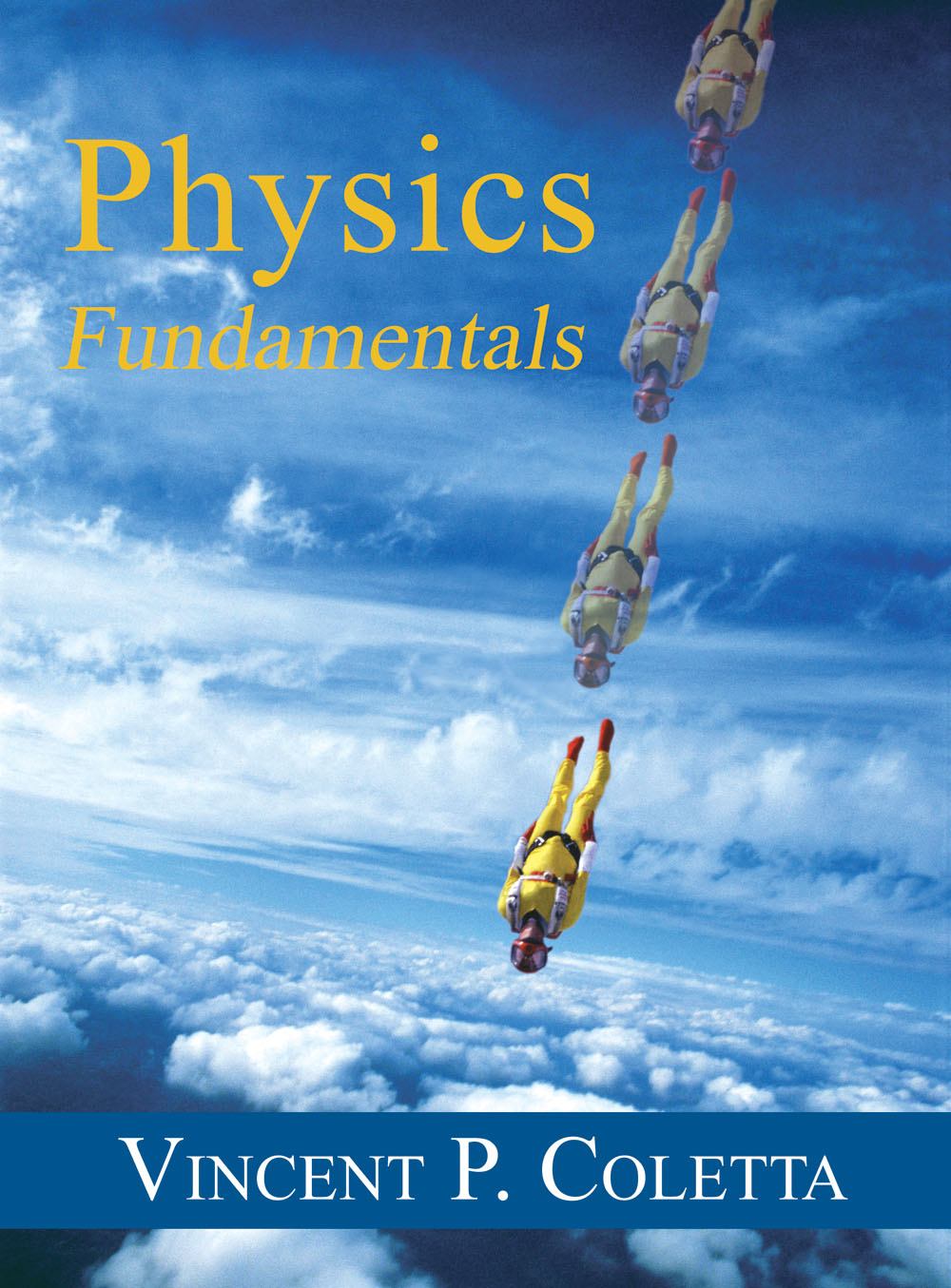Physics LE is a multifaceted online homework platform which includes a comprehensive library of interactive physics simulations. Homework problems feature randomized values, specific student feedback, intermediate problem-solving steps, and an intelligent automatic grading system.
Physics LE Question Bank is Universally Adoptable—comprised of over 5000 problems having a wide range of difficulty. The stand-alone problems can be aligned with any algebra or calculus-based physics course.
View Topics Covered
Library of 100+ Interactive Simulations cover all major topics in introductory physics. Their versatility allows for use in an online lab course employing numerical data, or as an addition to homework problems to deepen conceptual understanding of physics principles.
Assignments, Quizzes, and Simulation Exercises can be Quickly Assembled using Physics LE Question Bank content. Grading students’ work and management of grade data are handled automatically saving significant amounts of time.
Students Receive Specific Feedback when solving problems, with their answers evaluated using sophisticated algorithms. The system emulates the rigorous process of an instructor performing manual grading.
Problems Employ Intermediate Steps to help students formulate a problem-solving strategy, and Randomized Values to give each student a unique version of the problem.
OpenStax Physics Textbooks are Fully Supported—University Physics, College Physics, College Physics for AP Courses, and High School Physics. All chapter-end problems from these textbooks are included in the Physics LE Question Bank.
Physics Fundamentals eTextbook by Vincent Coletta is built into Physics LE and accessible to every student. The eTextbook is comprised of 30 Chapters, 960 pages, and 1500 photographs & illustrations.
Physics LE Universal Question Bank
Universal and Comprehensive
The Physics LE Question Bank houses an extensive library of more than 5000 problems for algebra-based and calculus-based introductory physics courses. The Physics LE Question Bank is textbook independent and universally adoptable, featuring a broad range of problems with varying difficulty levels to accommodate any physics course. Individual problems are categorized by general topic headings to provide quick and easy correlation to your course (e.g., acceleration in one-dimension, projectile motion, work and kinetic energy, electric fields, . . . ).
Physics LE Problem Features
Randomized Values
Physics LE problems utilize randomization of the numerical values used in the problem. This ensures that each student receives a unique version of the problem. Most problems have approximately 100 unique variations. This prevents plagiarism among students and makes it nearly impossible for students to search online for the answer to a particular problem variation.
Intermediate Problem-Solving Steps
Rather than just requiring students to enter a final numerical value, many Physics LE problems incorporate intermediate problem-solving steps to help guide the student through the problem, also allowing partial credit to be awarded. Intermediate steps include varied use of: 1) multiple-choice questions checking for understanding and problem-solving approach (using text or diagrams), 2) input of relevant equations or algebraic expressions, and 3) input of intermediate numerical values which need to be calculated to obtain the final answer.
Specific Feedback
For all numerical answers specific feedback is provided to students using sophisticated algorithms which evaluate the following: correct numerical value (within a set tolerance), correct unit, order of magnitude errors, sign errors, and common misconception errors.
Numerical Problems and Multiple-Choice Questions
In addition to numerical problems, the Physics LE Question Bank also contains multiple-choice questions. Multiple-choice questions are conceptual and also numerical in style, with numerical MC questions utilizing randomized values.
Versatile Problem Behavior Modes
Based upon the desired objective for the assignment or quiz, the instructor can choose how students interact with problems: single attempt only, multiple attempts with no penalties, or multiple attempts with penalties.
Click on sample problem to enlarge
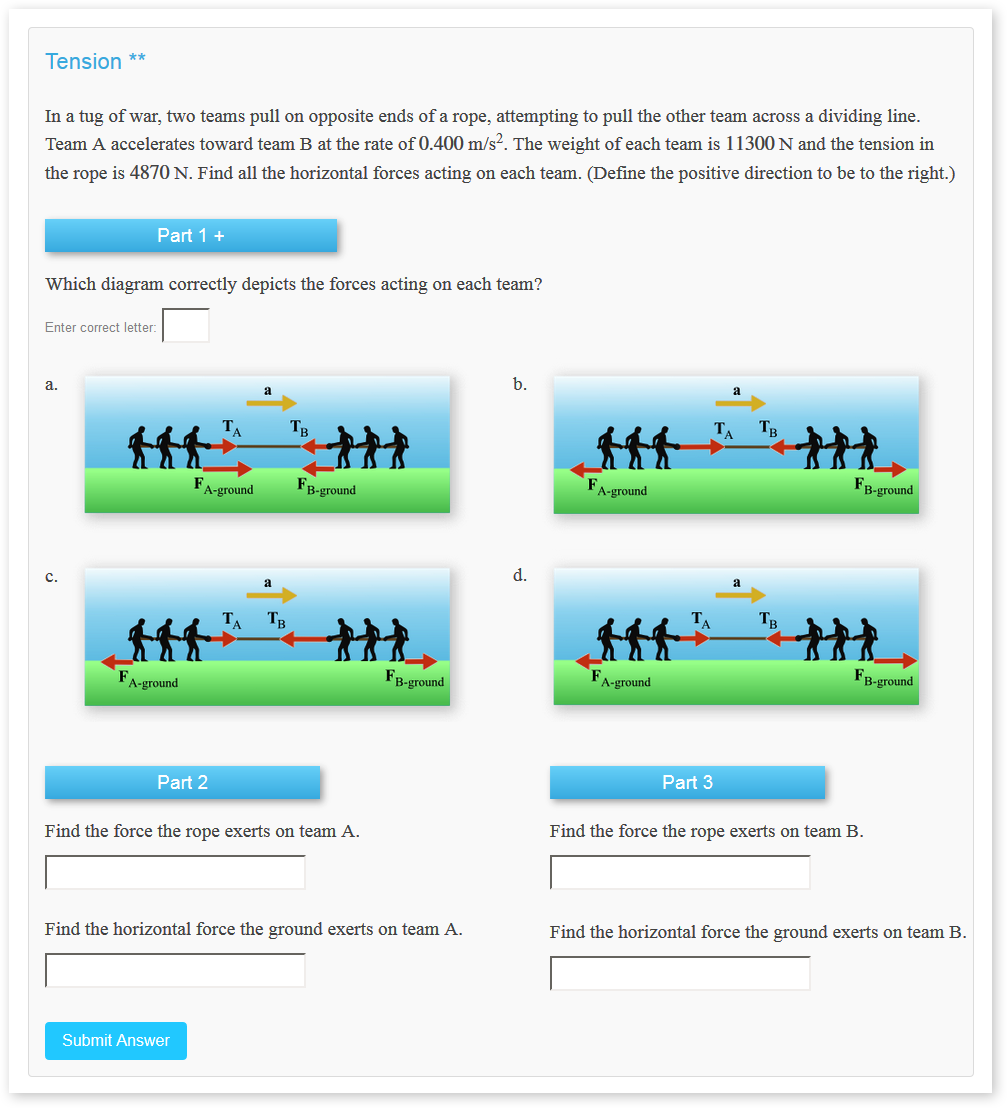
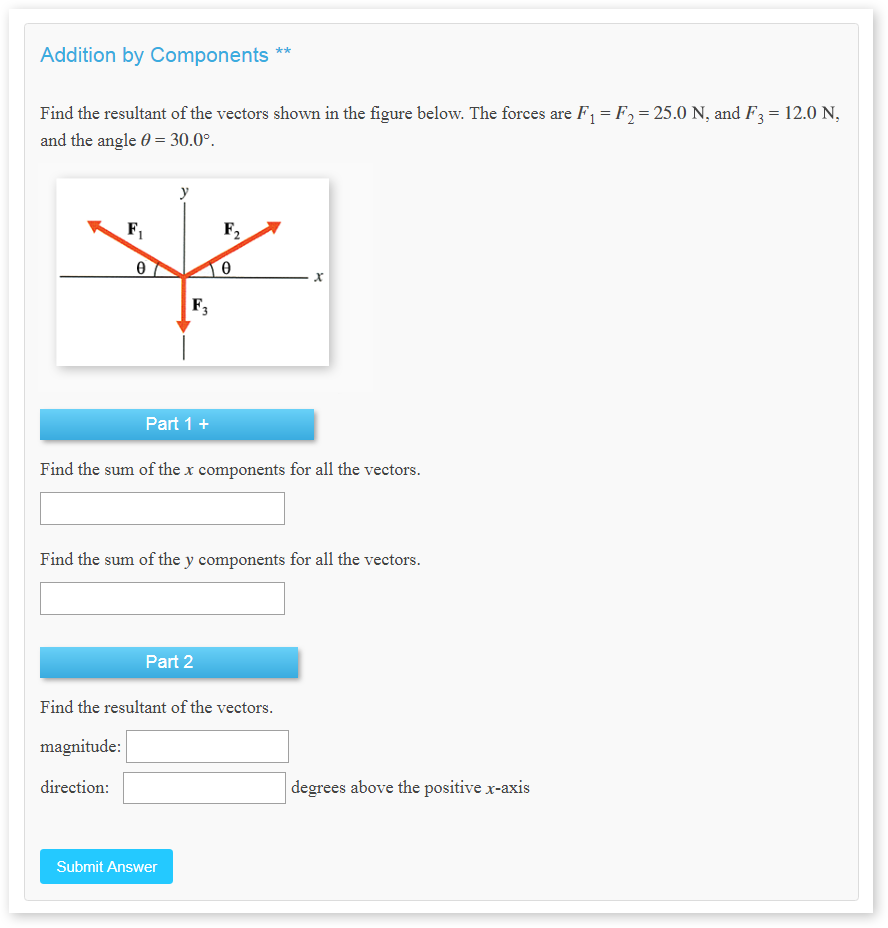
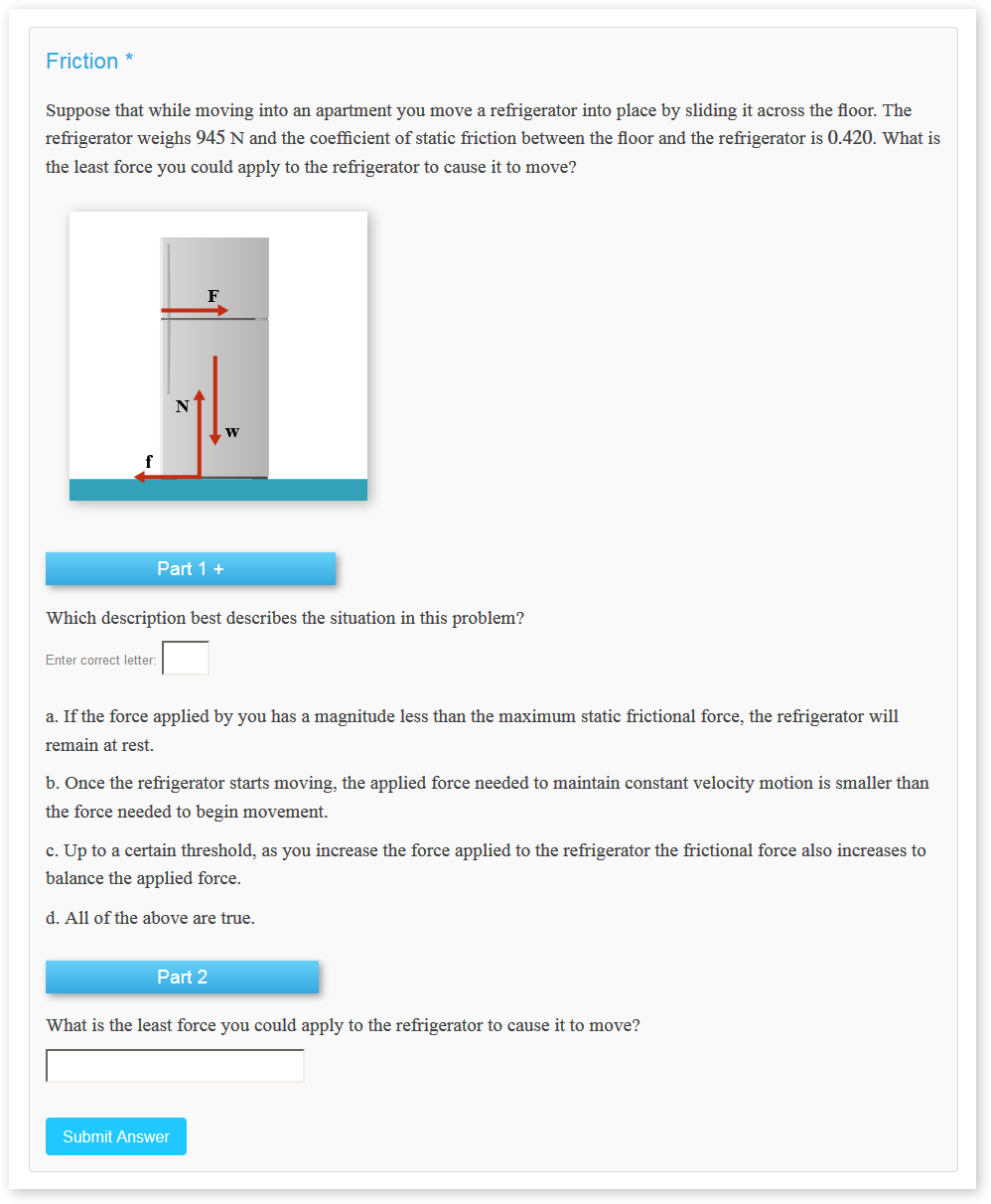

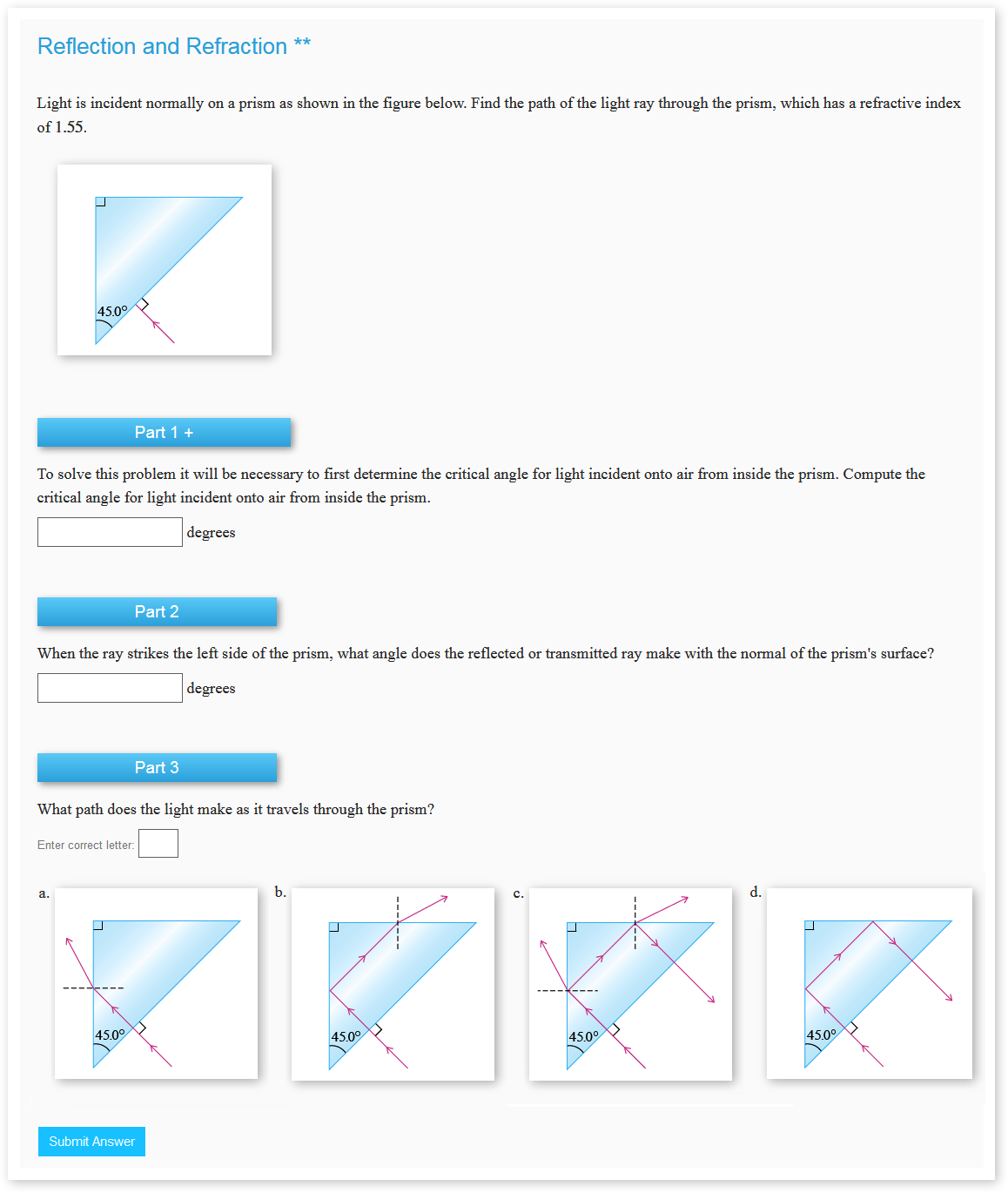
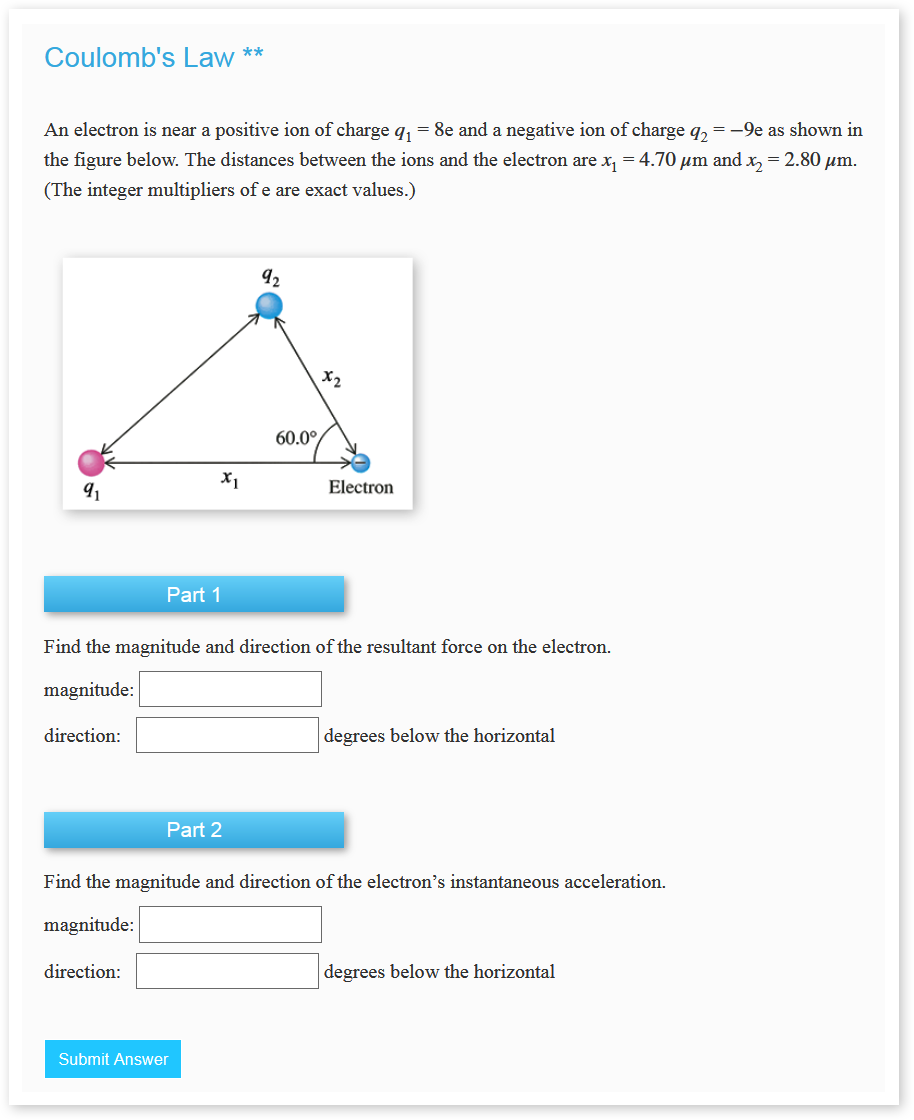
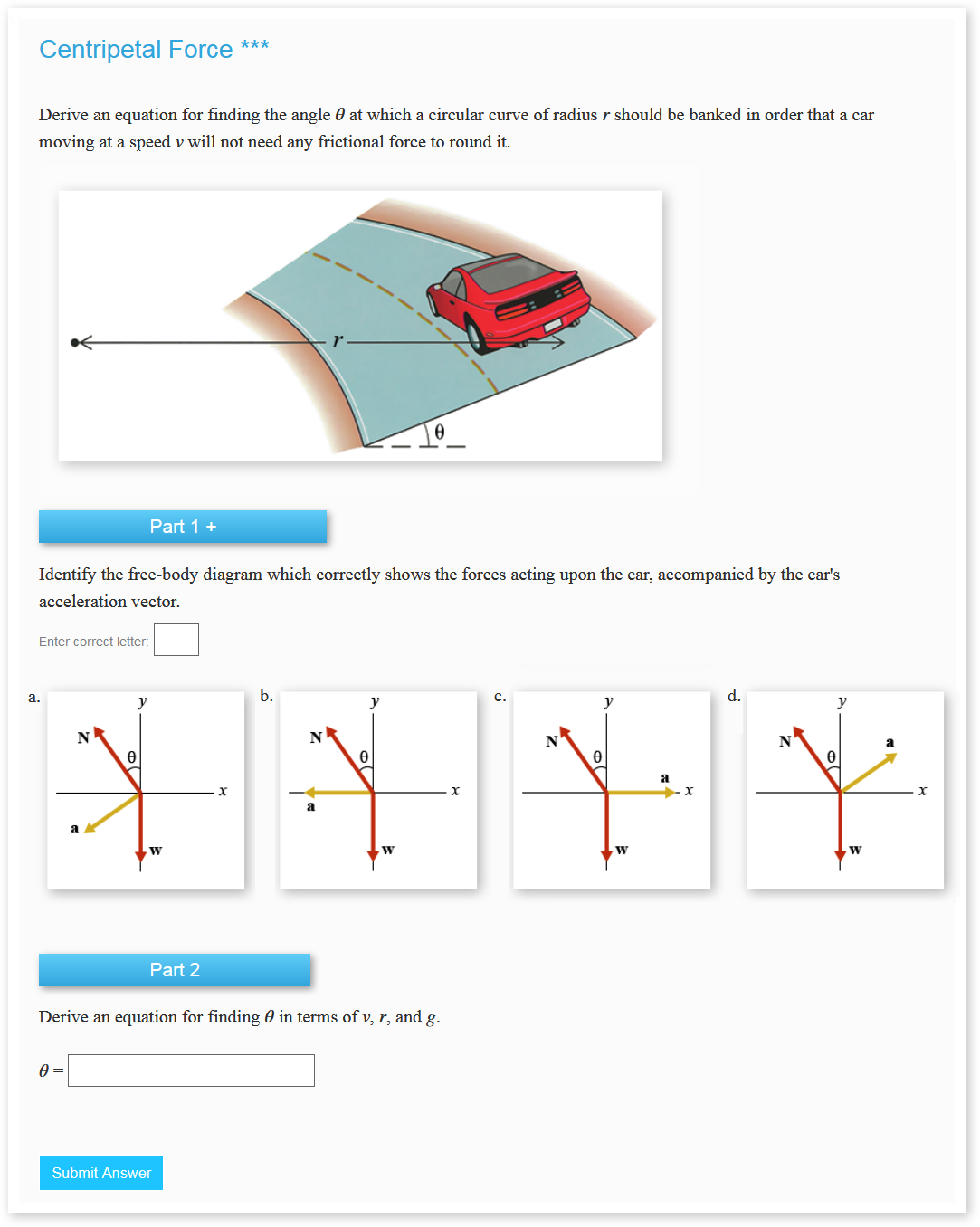
Physics LE Interactive Simulations
Comprehensive Library of Simulations
Physics LE's 100+ interactive simulations are carefully designed to encompass all major topics in introductory physics. The versatility of the simulations enables them to be utilized for data gathering in an online lab course, or to complement homework problems by providing a deeper conceptual understanding of fundamental principles. (Simulations run full-screen inside a web browser.)
Interactive Simulations
Each interactive simulation accurately recreates the physical world allowing in-depth investigations to be carried out. Designed to be highly interactive and highly visual, users are given full control over relevant experimental variables allowing different scenarios and physical relationships to be investigated.
Integrated Simulation Exercises
Simulation exercises are integrated into each simulation and are comprised of numerical and multiple-choice style questions. The exploratory questions guide the student through the process of making key observations, gathering data, and drawing conclusions. Students receive immediate feedback to questions and are able to input answers while simultaneously running the simulation. Student answers are evaluated and recorded automatically in the instructor gradebook.
(Simulations are also accessible in stand-alone format without exercises.)
View Sample Simulation Exercise
Click on sample physics simulation to enlarge
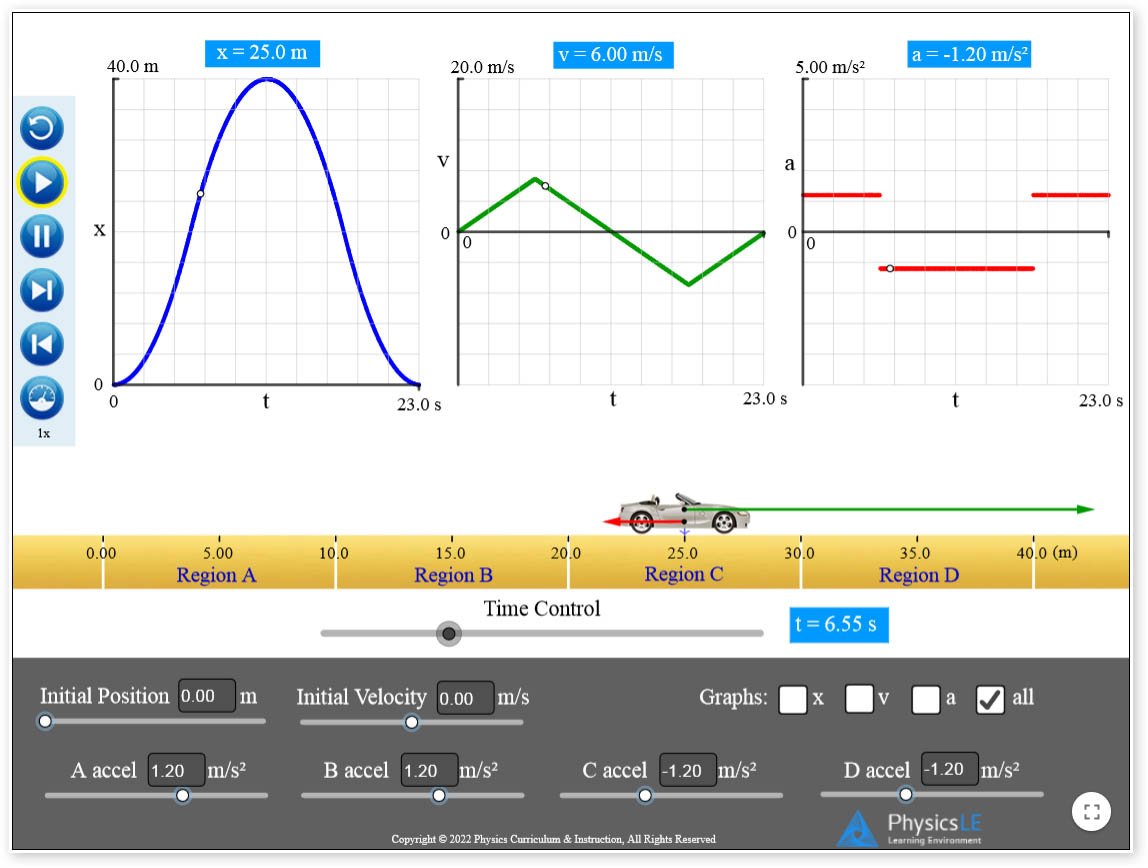
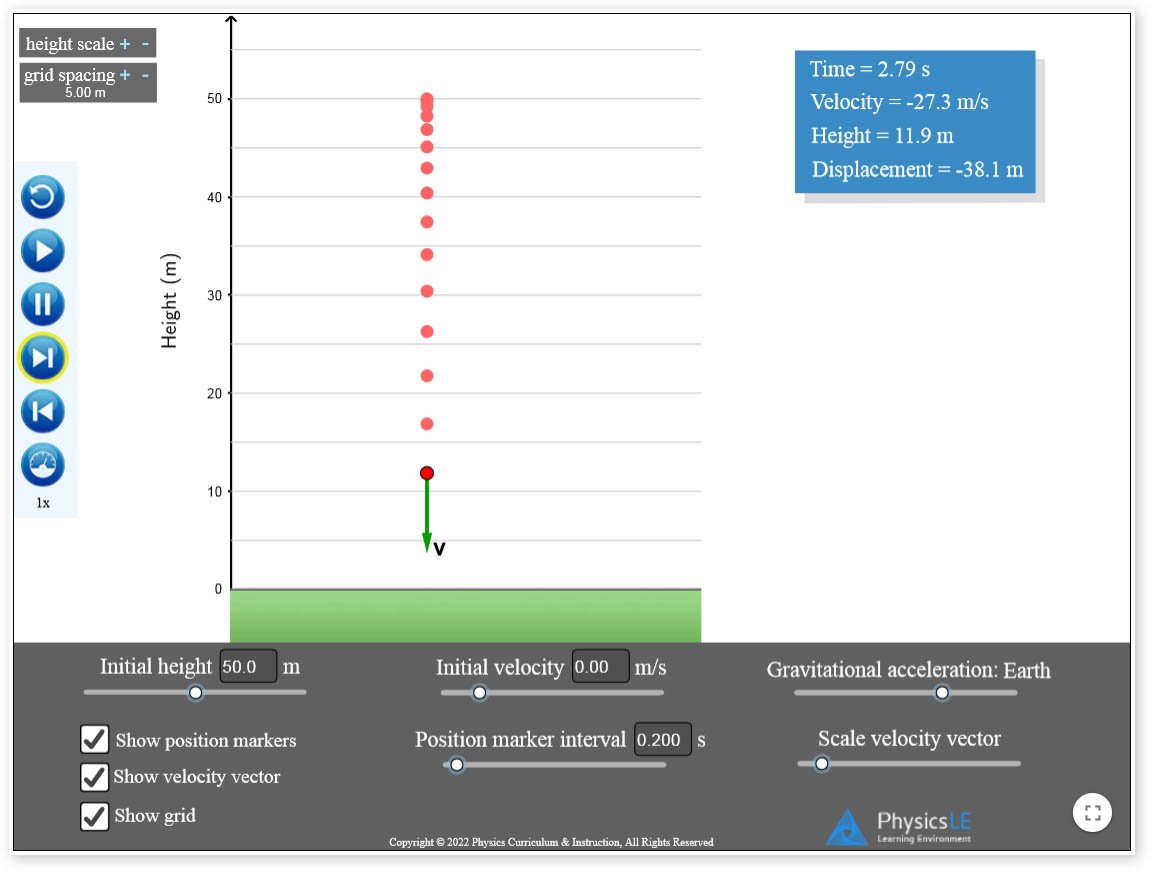
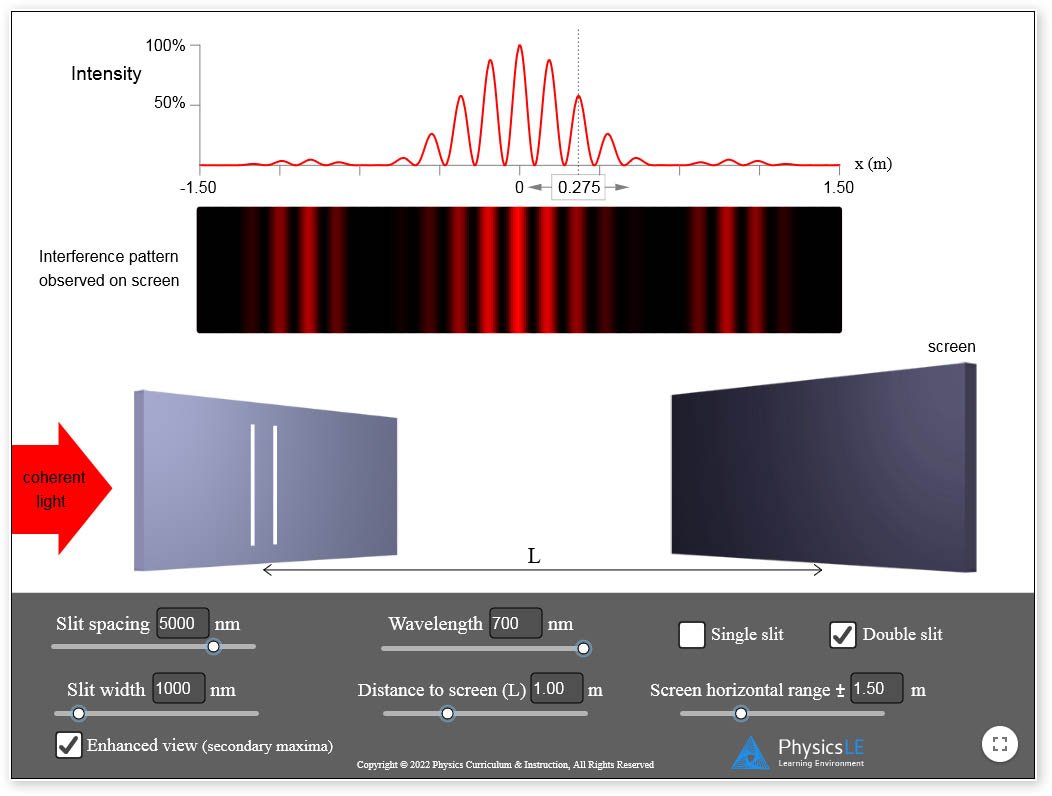
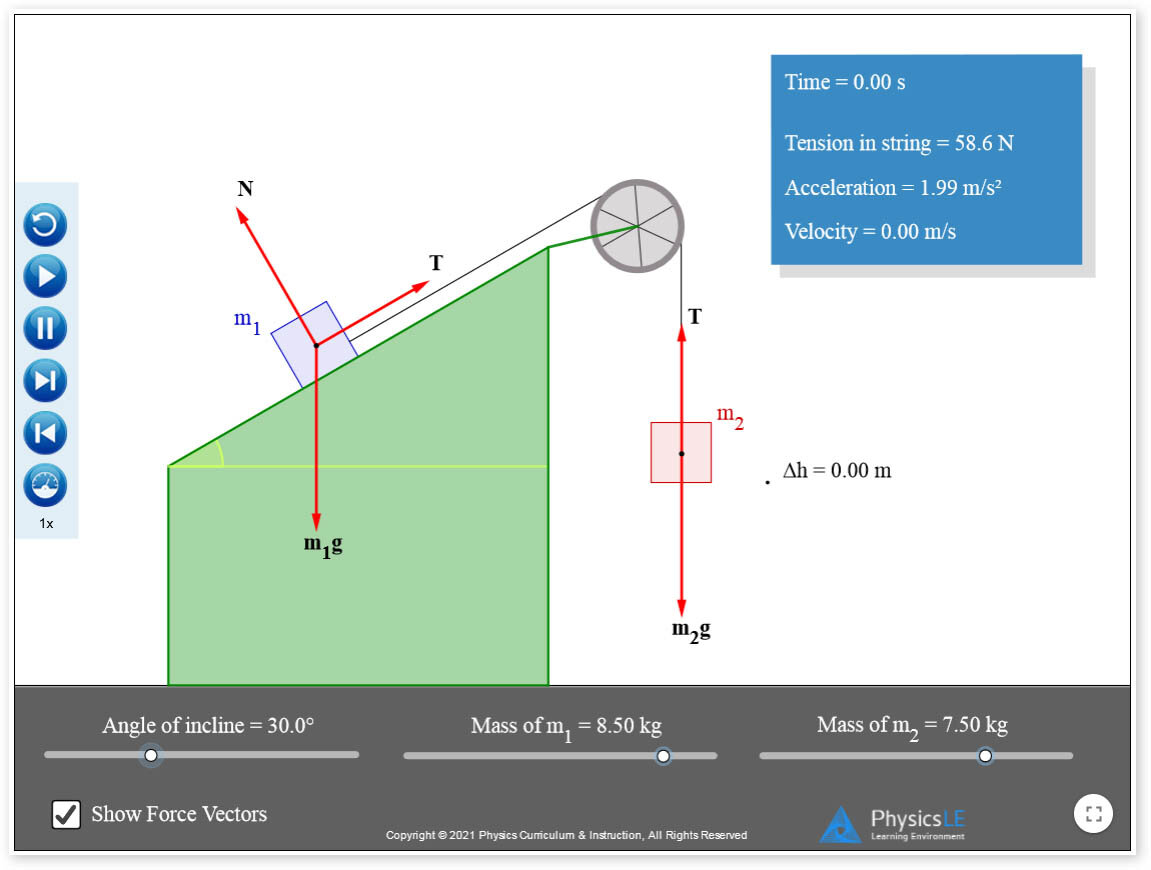
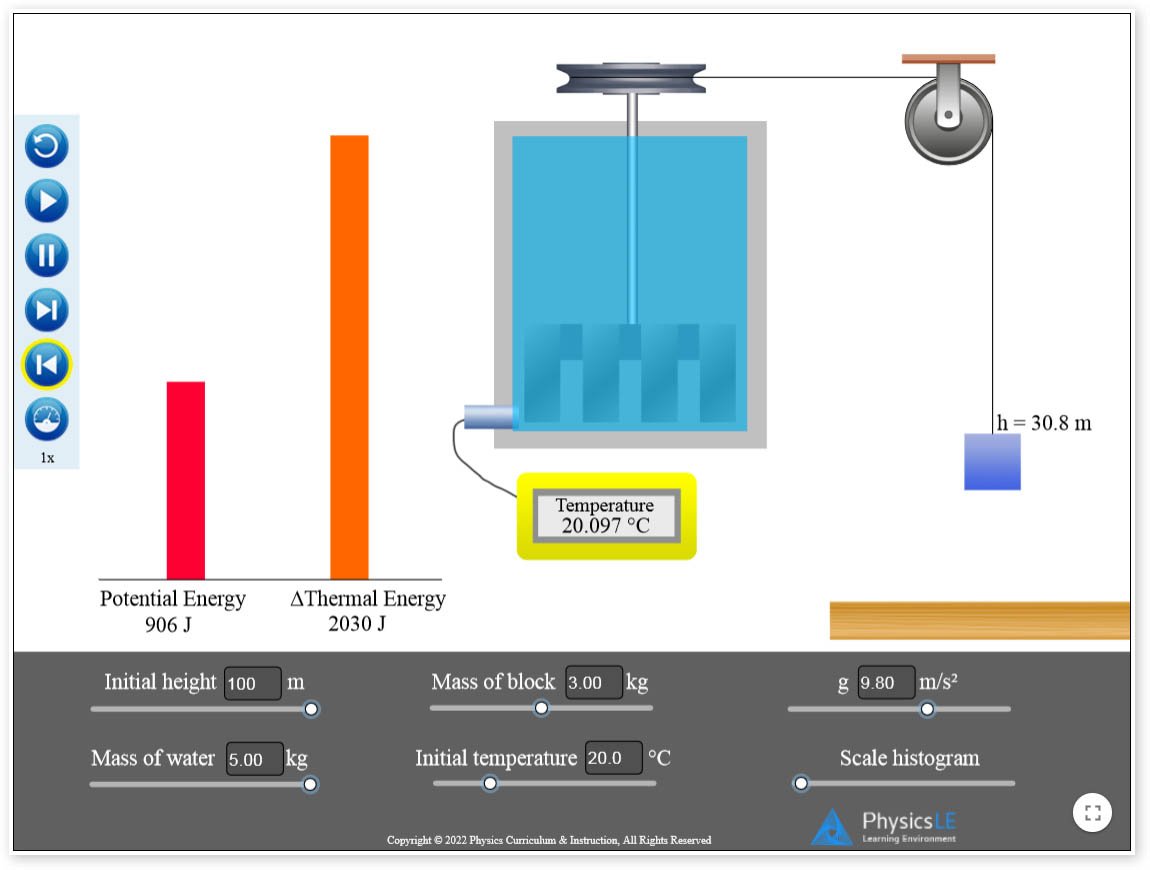
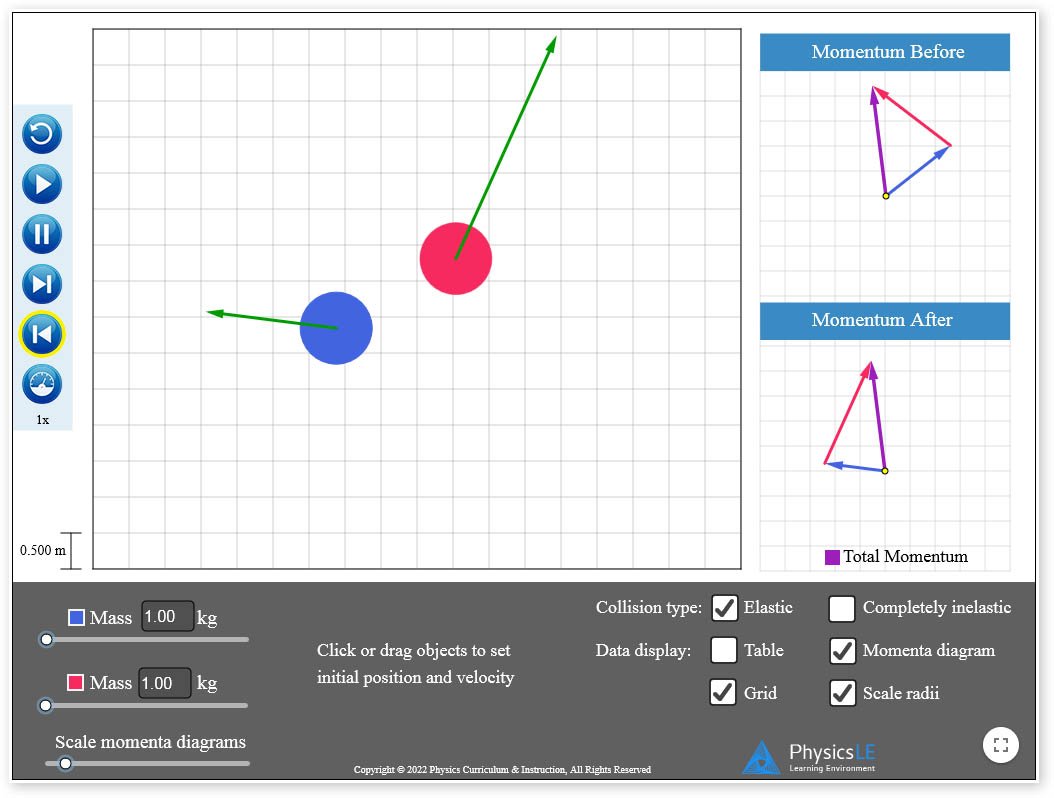
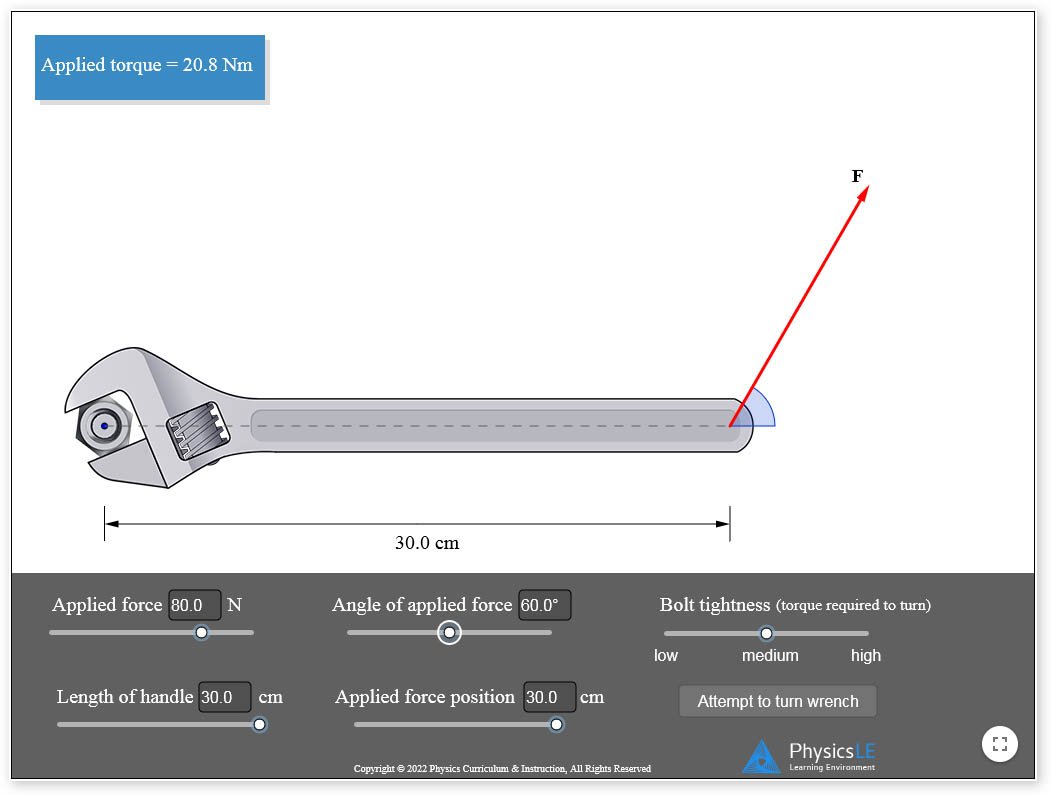
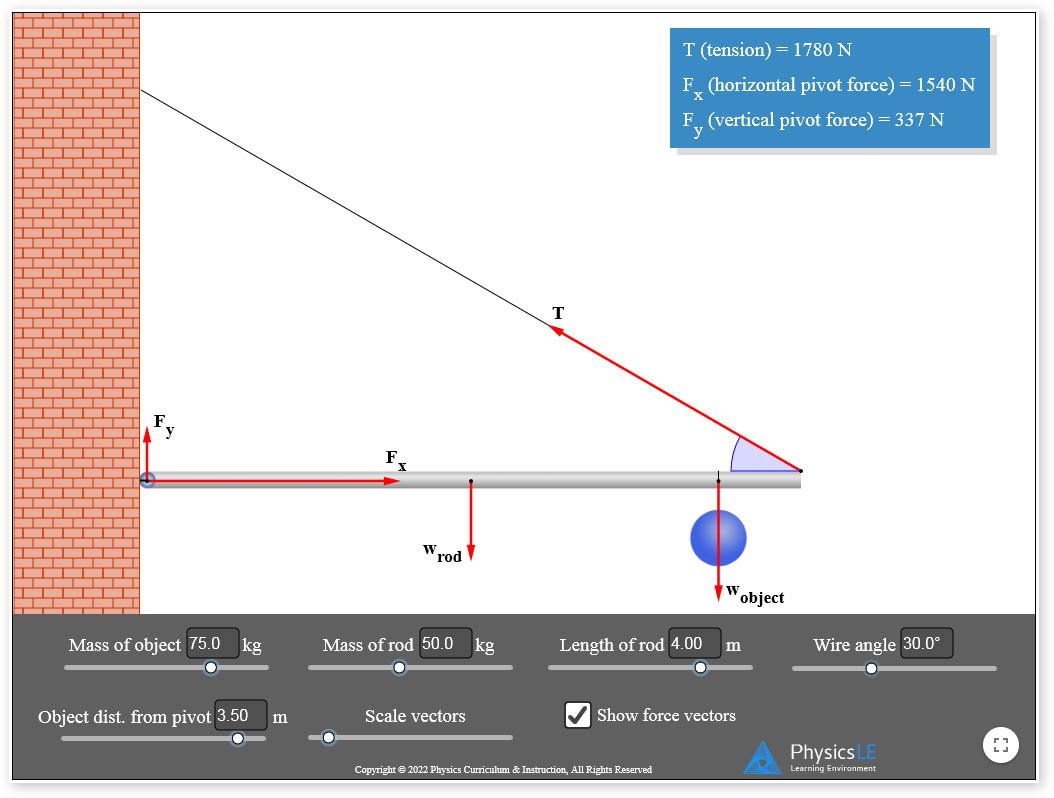
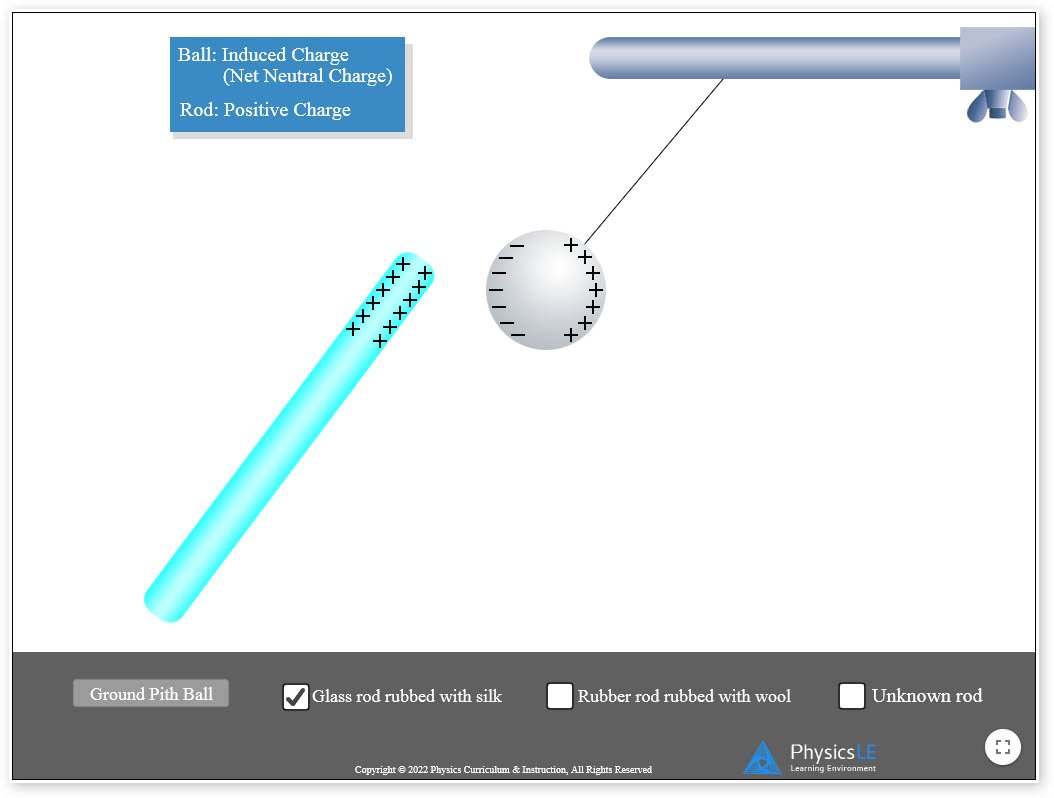
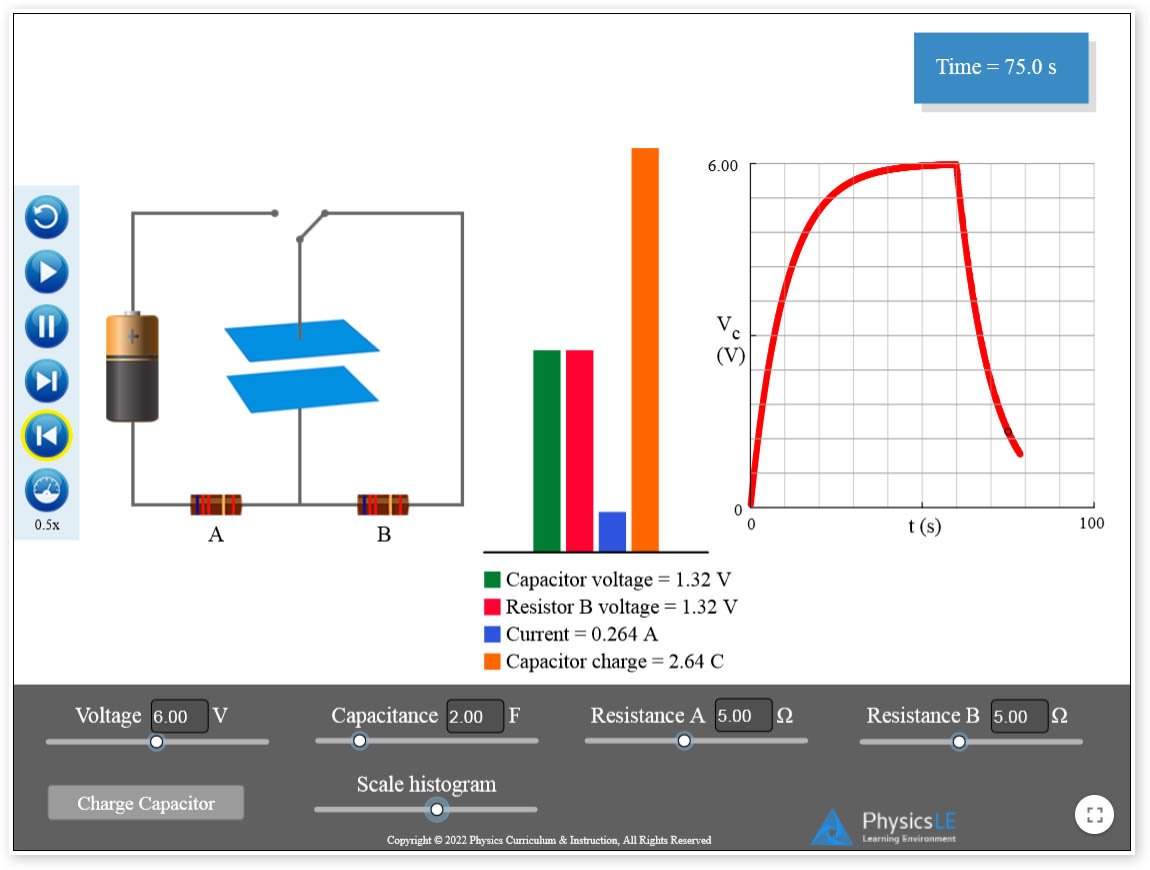
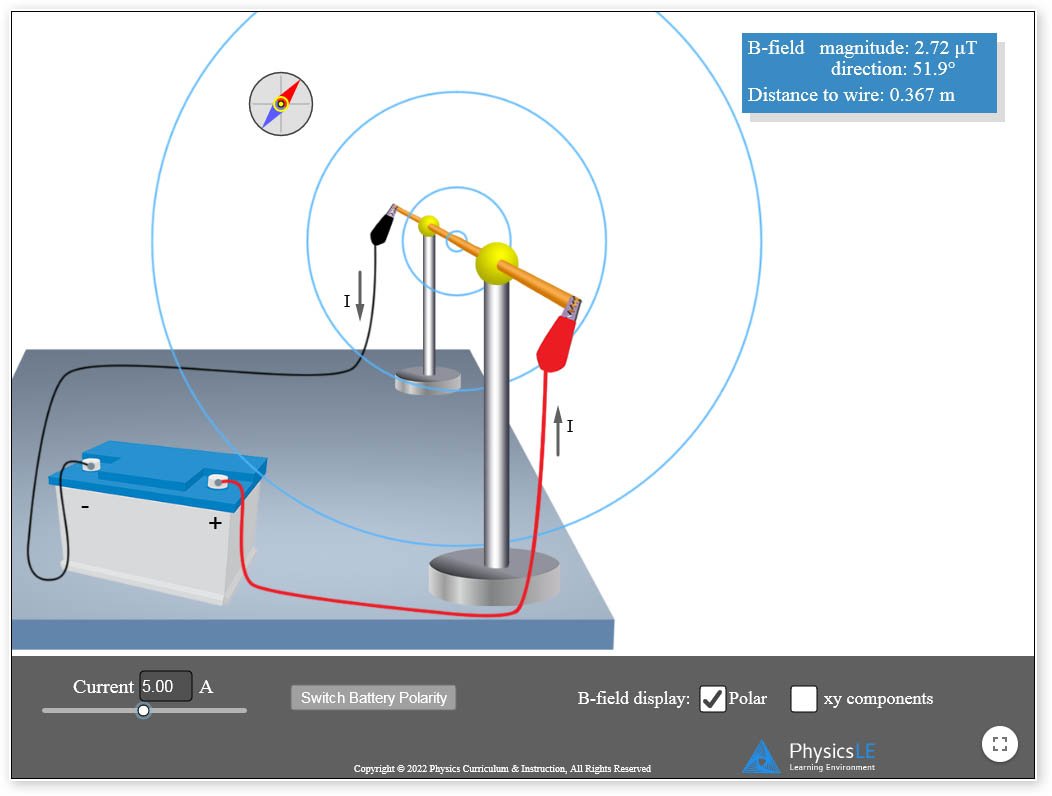
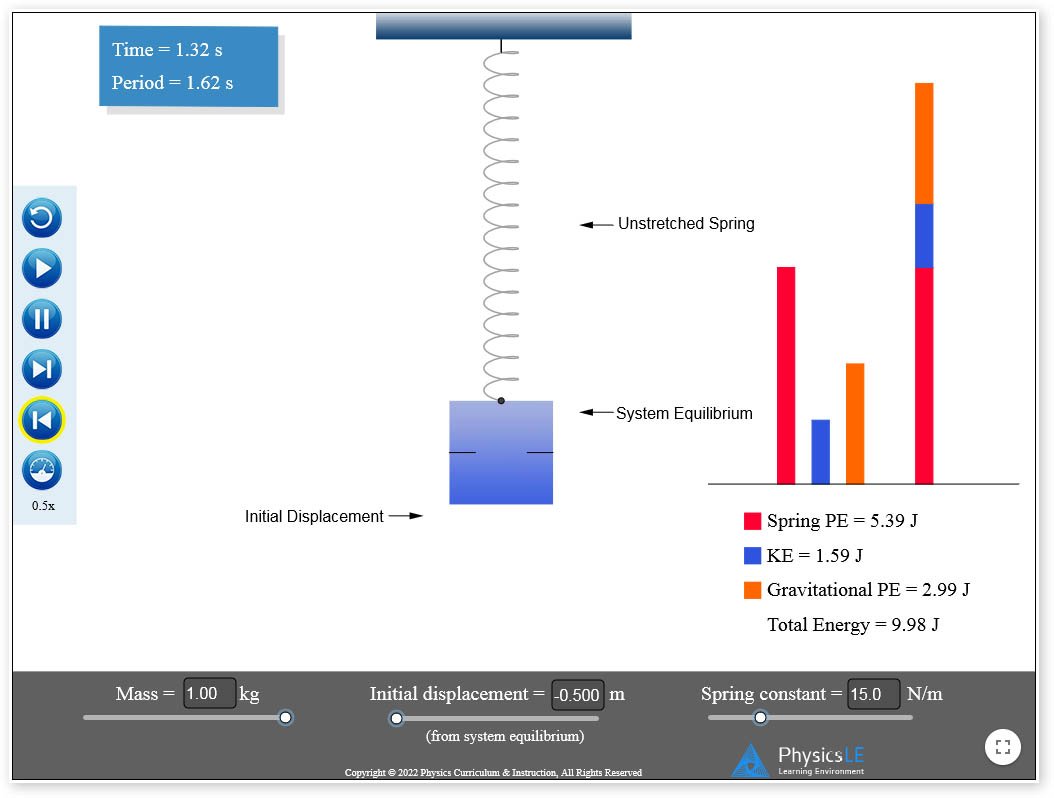
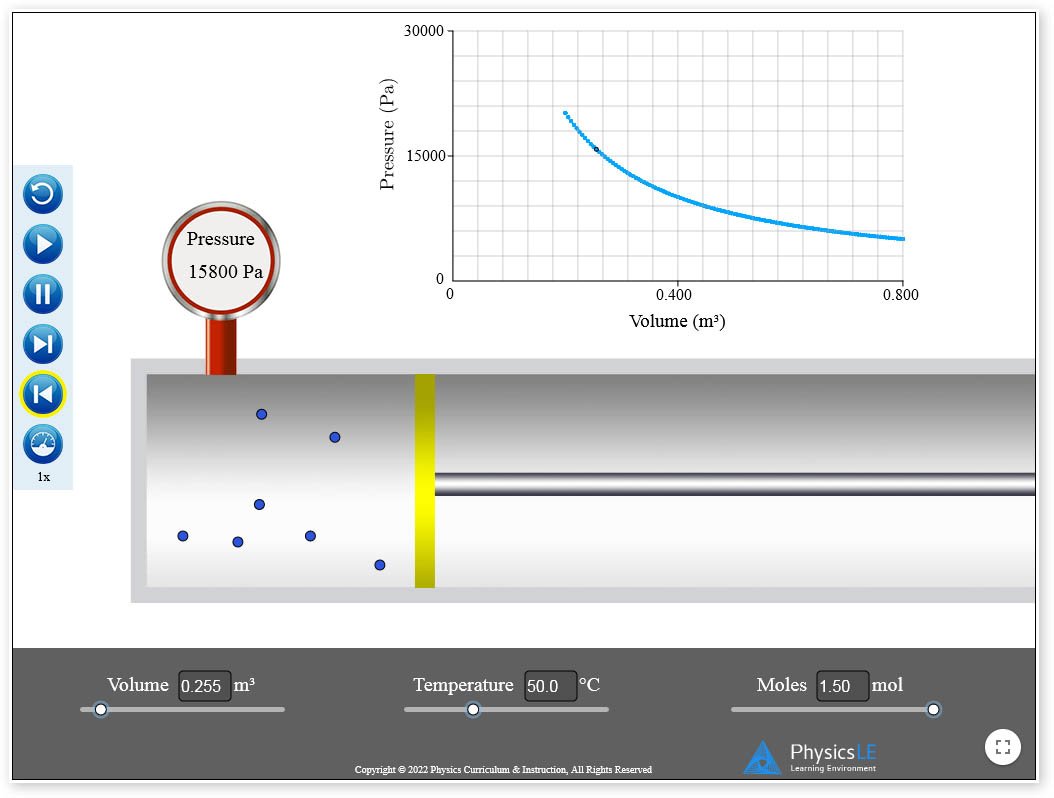
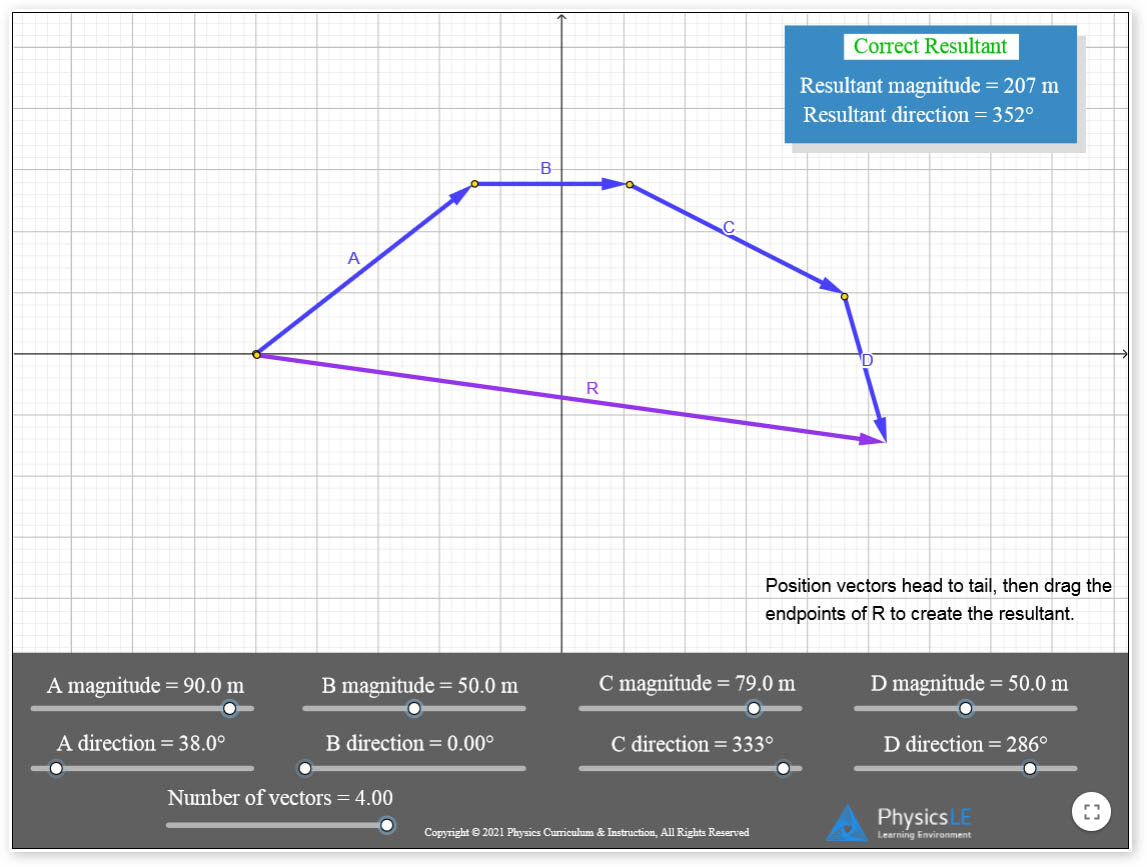
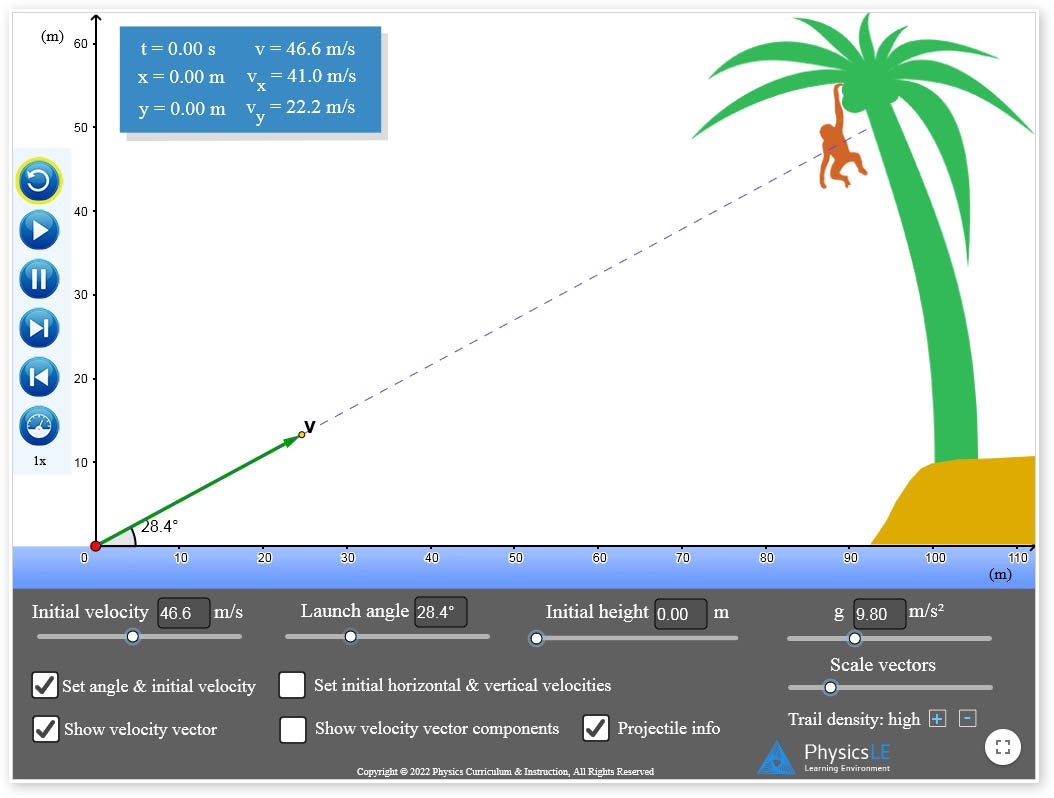
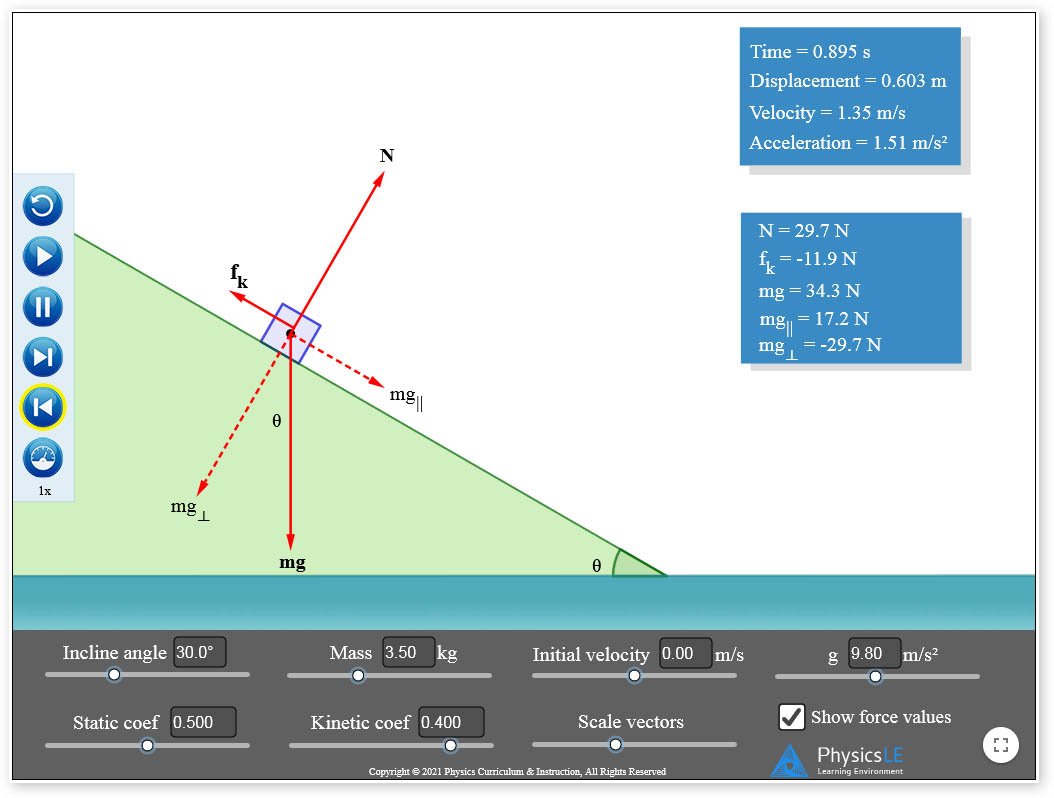
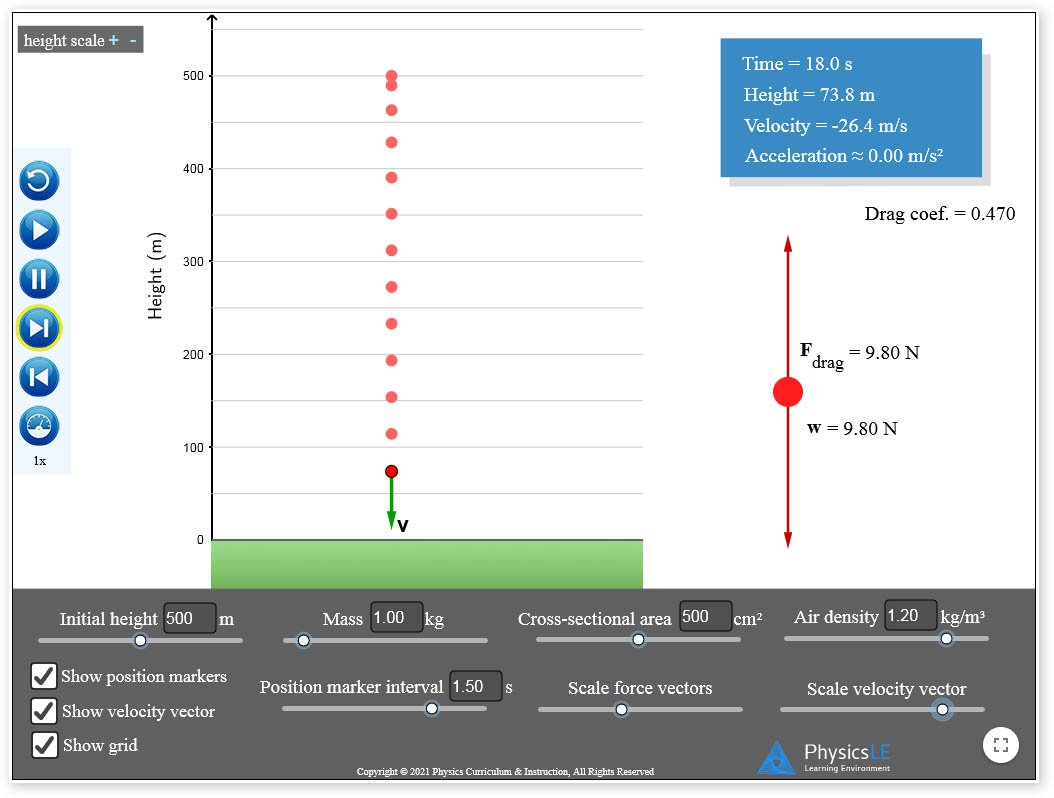
Analytics & Gradebook
Analytics
The Statistics & Student Results modules provide analytics at the individual and course level, allowing the instructor to quickly assess student performance on an assignment, quiz, or lab. This information can can help identify patterns and how well students are grasping the material.
The following Statistics & Student Results reports help instructors quickly capture insights into student performance:
Overall assignment or quiz - average score, median score, standard deviation, skewness, error ratio, and standard error.
Individual problems - average score, standard deviation, intended weight, effective weight, and discrimination index.
Individual students - overall score and score for each question, as well as responses to individual questions.
Gradebook
The Physics LE Gradebook automatically records student scores and places them in the proper category (e.g., homework, quizzes, labs, or a custom category). The desired weighting can be assigned to individual assignments & quizzes, with overall weighting assigned to categories. Grading curves can easily be established to automatically determine a letter grade. The Gradebook can be readily exported in a variety of formats.
Click on sample report to enlarge
Physics Fundamentals Textbook
Included with Physics LE
The Physics Fundamentals eTextbook by Vincent Coletta is built into Physics LE and accessible to every student at no extra cost. The eTextbook is comprised of 30 Chapters, 960 pages, and 1500 photographs and illustrations. The Physics LE Question Bank directly syncs with all problems contained in the Physics Fundamentals textbook.
Dr. Coletta is a Professor of Physics at Loyola Marymount University in Los Angeles. His research in PER (Physics Education Research) has provided better understanding into student reasoning skills and strategies to address difficulties students encounter in learning physics.
More information about Dr. Coletta's Physics Fundamentals textbook.
OpenStax Physics Textbooks—Seamless
Integration with Physics LE Online Homework
The Physics LE Question Bank contains all chapter-end problems from the following OpenStax textbooks: University Physics, College Physics, College Physics for AP Courses, and High School Physics. The Physics LE numbering system directly correlates to that used in OpenStax. OpenStax physics problems are enhanced with randomized values, specific student feedback, intermediate problem-solving steps, and all the features Physics LE has to offer.
OpenStax provides free, open-source, professional quality, peer-reviewed textbooks. Learn more about OpenStax.









